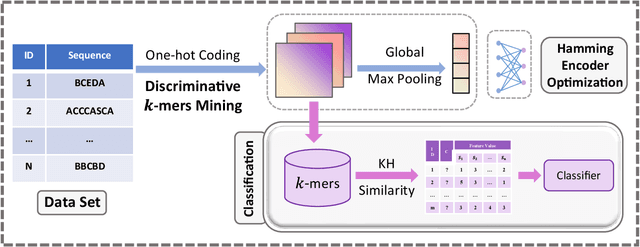Hamming Encoder: Mining Discriminative k-mers for Discrete Sequence Classification
Paper and Code
Oct 20, 2023



Sequence classification has numerous applications in various fields. Despite extensive studies in the last decades, many challenges still exist, particularly in pattern-based methods. Existing pattern-based methods measure the discriminative power of each feature individually during the mining process, leading to the result of missing some combinations of features with discriminative power. Furthermore, it is difficult to ensure the overall discriminative performance after converting sequences into feature vectors. To address these challenges, we propose a novel approach called Hamming Encoder, which utilizes a binarized 1D-convolutional neural network (1DCNN) architecture to mine discriminative k-mer sets. In particular, we adopt a Hamming distance-based similarity measure to ensure consistency in the feature mining and classification procedure. Our method involves training an interpretable CNN encoder for sequential data and performing a gradient-based search for discriminative k-mer combinations. Experiments show that the Hamming Encoder method proposed in this paper outperforms existing state-of-the-art methods in terms of classification accuracy.
 Add to Chrome
Add to Chrome Add to Firefox
Add to Firefox Add to Edge
Add to Edge